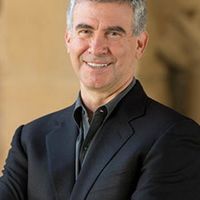Daniel Schwartz

Dean of the Graduate School of Education and the Nomellini & Olivier Professor of Educational Technology
PhD, Columbia University, Human Cognition and Learning (1992)
MA, Columbia University, Computers and Education (1988)
BA, Swarthmore College, Philosophy and Anthropology (1979)
Teaching Certificate, University of Southern California (1981)
Concentration Advising in:
Academic Appointments
Professor, Graduate School of Education
Member, Bio-X
Faculty Affiliate, Institute for Human-Centered Artificial Intelligence (HAI)
Member, Wu Tsai Human Performance Alliance
Member, Wu Tsai Neurosciences Institute
Boards, Advisory Committees, Professional Organizations
Assistant and Associate Professor of Psychology and Human Development, Vanderbilt University (2018 - Present)
Programmer & Instructor in Lisp, C, & Assembler, . (2018 - Present)
Research Scientist, Learning Technology Center at Vanderbilt (2018 - Present)
Teacher of Mathematics, Kitiwanga Day School, Kitiwanga, Kenya (2018 - Present)
Teacher of Mathematics, Science, Reading and Language Arts, Kaltag Jr. & Sr. High Schools, Kaltag, AK (2018 - Present)
Teacher of Remedial Reading and Writing, John Muir Jr. High, Los Angeles, CA (2018 - Present)
Honors & Awards
Outstanding Young Teacher Award, University of Southern California (1979)
Sylvia Scribner Award, American Education Research Association (2015)
Career Achievement Educational Psychology, American Psychology Association (2021)
Klaus Jacobs Prize, Klaus Jacobs Foundation (2021)
Daniel L. Schwartz is the I. James Quillen Dean and Nomellini & Olivier Professor of Educational Technology at Stanford Graduate School of Education. He leads the Stanford Accelerator for Learning, a major interdisciplinary initiative advancing the science and design of learning to bring effective and equitable solutions to the world. An expert in human learning and educational technology, Schwartz also oversees a laboratory that creates pedagogy, technology, and assessments that prepare students to continue learning and adapting throughout their lifetimes. He has taught math in rural Kenya, English in south-central Los Angeles and multiple subjects in Kaltag, Alaska. He is author of "The ABCs of How We Learn: 26 Scientifically Proven Approaches, How They Work, and When to Use Them."
Contact
Telephone
(650) 725-9090
Email
Daniel.Schwartz [at] stanford.edu
Info Links
External Profile